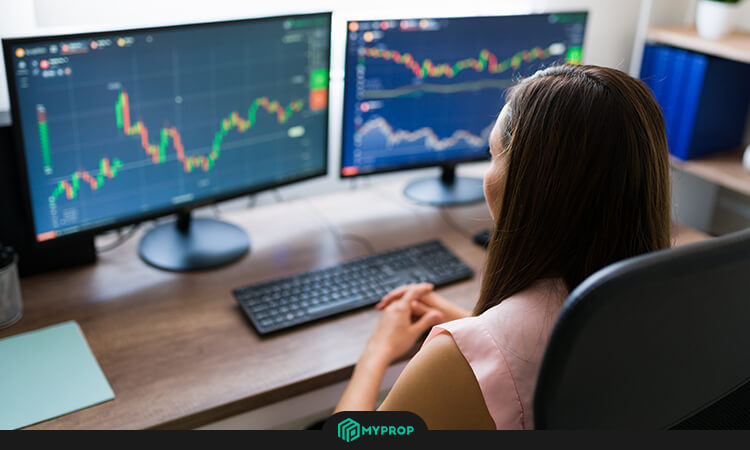Overcoming mental challenges in prop trading
Prop trading can be a lucrative and exciting career path for financial market traders, however, this career will not be without challenges. One of the most important challenges prop traders always face is overcoming mental challenges. Traders in financial markets are constantly faced with price fluctuations, the possibility of loss and uncertainty about the future.
These are factors that can easily cause feelings such as stress, anxiety and fear. As a trader in the financial markets, if you don’t have the ability to overcome these mental challenges, you will have problems in trading such as poor decisions, financial losses and job loss.
A trader’s mind is his most powerful tool and at the same time, his biggest obstacle in trading. Overcoming mental challenges in trading is the key to achieving success and consistency in prop trading. In this article, we will examine some of the most common mental challenges that prop traders face and give solutions to overcome them.
Different emotions in trading
fear
Fear is one of the strongest emotions that can affect your trading decisions; All human beings will face the feeling of fear during their life, but in prop trading if the trader cannot control this feeling and fear, the consequences will be big losses and job loss. Fear of loss can keep you from trading even when there is a great opportunity to make a profit on the trade.
The negative effects of fear in trading
Emotional trading: Emotional trading is one of the most obvious negative consequences of fear in trading. In this case, instead of trading based on logic and analysis, the trader makes trading decisions based on his feelings, which will cause a lot of losses.
Failure to enter trades: Fear can prevent traders from entering trades. This makes good opportunities to earn profit in trading disappear.
Early exit from trades: Traders may exit trades early out of fear of losing their profits; This can lead to missed trading opportunities.
Passivity in trading: Fear can make traders remain passive during trading and avoid taking timely action to increase profits or reduce losses.
Greed
Greed is a natural human emotion that creates the desire to earn more profit. This feeling can play an important role in traders’ trading decisions and lead to financial losses.
The negative effects of greed in transactions
Decisions without thinking: Greed can cause traders to trade without a plan and thinking and greedy for more profit, which will only cause losses.
Increased risk: Greed causes traders to accept higher risks in trading in order to earn more profits, which greatly increases the probability of loss.
Failure to adhere to the trading plan: traders’ greed makes them not follow their trading plan, which is based on analysis and logic, and make trades without a plan and based on emotions.

Lack of self-confidence
Low self-confidence will take courage from the trader and prevent him from making decisive decisions in transactions.
Negative effects of lack of confidence in transactions
Missing opportunities: Without confidence, traders may avoid entering profitable trades due to fear of loss.
Increased loss: lack of confidence will cause traders to stay in losing trades hoping for price recovery.
Stress and anxiety: trading without self-confidence can cause a lot of stress and anxiety in traders; A trader who does not trust his abilities will not succeed in the market.
False confidence
False confidence is a feeling that makes a person overestimate his trading abilities and skills. This feeling can be dangerous in financial market transactions and cause financial losses.
Negative effects of false confidence in trading
Ignorance of risk: false self-confidence makes traders enter into transactions without considering risk and trade and buy and sell in the market.
Ignoring negative signals: traders with false confidence may think that they have the ability to control and predict the market and can avoid losses; Therefore, they ignore negative signals.
Focus on past profits: These people only focus on their past profits instead of focusing on current market conditions.
Not admitting mistakes: False self-confidence makes traders not admit their mistakes and blame only external factors instead of themselves.
Strategies to control emotions in transactions
Here are some of the most effective strategies for controlling emotions in financial markets and trading.
Education and study
Better mastery of market analysis and trading will help you make your trading decisions more confidently and avoid making decisions based on emotions. The more you know about the market, the less you will be influenced by emotions.
Decrease in transaction volume
A very effective way to control emotions in transactions is to reduce the size and volume of transactions. The smaller the size of your transactions, the lower the risk and the capital at risk. This will create less stress in the trader and the trader will be more able to control his negative emotions in contrast to large trades with high volume.
Creating a trading program and journal
Having a specific trading plan for each transaction is one of the most important ways to control your emotions. A trading plan helps you channel your emotions into a logical framework, maintain trading discipline , focus on your goals, and increase your trading confidence.
keep calm
Peace of mind plays an essential role in the success of traders in the financial markets. When traders have a calm mind, they can think more clearly, master their emotions and make more rational decisions. To keep calm, avoid constantly checking prices in the market and stick to your trading plan and let the market do its work; Also, instead of focusing on short-term market fluctuations, focus on your long-term goals.
final word
In prop trading, the ability to control emotions is one of the most important differences between successful traders and other traders. When a trader in the market does not control his emotions and makes trading decisions based on them, he will undoubtedly face failure. Remember that overcoming mental challenges is a continuous process and requires effort; With patience, practice and applying the right strategies, you can overcome your mental challenges and become a successful prop trader in the market.
